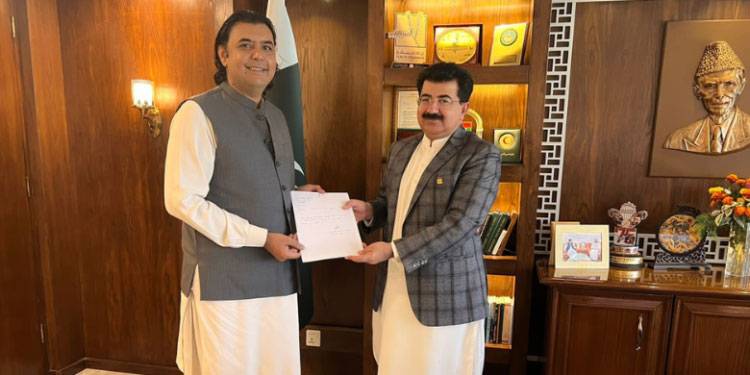
It was already too late. The resignation was anticipated a year ago. Mustafa Nawaz Khokhar was waiting to be asked to step down, so that he could not be accused of changing his political loyalty. It was a test of patience.
He agreed to step down as soon as he was asked to, even to the astonishment of those who asked for it. The reason being that it isn’t easy to ask a senator to resign. The Pakistan People’s Party did the same with Senator Babar Awan and he knew enough law to give them a run for their money.
A day before Awan’s term as a senator was to conclude, he left his party for Pakistan Tehreek-e-Insaf. Many aren’t aware that the PPP wasn’t happy with Rehman Malik either. He would meet some people without permission from the top cadre, while being in bad books of his party due to his conduct as a senator.
When the party asked him to part his ways with them, he just smiled. Later, he fell sick and eventually passed away.
So, those in the PPP top ranks thought the same about Khokhar, but he seemed ready for it. Not only that he nodded to the messenger, Senator Farooq Naek, but also took to social media to make a formal announcement.
It is thought that his statement in support of fellow Senator Azam Swati was the reason why he was told to step down. He narrates that an intelligence official had called and told him about one of the videos concerning Swati being fake.
According to Khokhar, he told the official he stood with his brethren while they stood with theirs. He was soon told to step down.
He had developed differences with his party even prior to the development. Some people deemed his style of politics quite different than that of his father, Haji Nawaz Khokhar and uncle, Imtiaz Khokhar.
Haji Nawaz served as the former deputy speaker of the National Assembly and left Pakistan Muslim League-Nawaz for the PPP because of his ties with Asif Ali Zardari. I have seen Mr. Zardari and Khokhar brothers facing several accountability cases together during General Musharraf era, perhaps the reason why Mustafa Khokhar was made a senator from Sindh.
The PPP leadership was in search of just a ‘loyal friend of the family’ in him, but it couldn’t see the ‘spark’ that many already had.
During his schooling days in Islamabad, Khokhar joined forces with fellow students to stage a protest against the administration. He was also behind a strike at the Islamabad College for Boys over delayed exams.
His father felt that his son had a ‘flair’ for leadership, so he was sent to the UK for higher education. He started studying International Law at the University of Birmingham and Safdar Hamdani was tasked with keeping an eye on him.
Hamdani was a student leader during his time at Quaid-e-Azam University, and he was really close to Zulfikar Ali Bhutto. He left for the UK after Gen Zia-ul-Haq imposed a martial law in the country.
He inspired the visits of Naheed Khan and several other political activists to Britain, but he couldn’t compromise with the deep-rooted feudalism inside his party because of his progressive thought process.
Hamdani was uncompromising on the military’s role in politics, and he used to live a difficult life with many of his comrades in the UK, and such hardship played a significant role in Khokhar’s political training.
Khokhar joined the International Committee of the Red Cross as a legal adviser and that’s when he found out the state institutions in Pakistan not just violate the local laws concerning human rights, but also the international ones.
In 2011, he was appointed as the adviser on human rights in the Yousuf Raza Gilani administration. I remember a lot of drone strikes taking place in Pakistan’s tribal areas at the time.
The PPP-led government wouldn’t make much noise on these attack. Khokhar, on the other hand, would ask for the matter to be raised at the United Nations. His unequivocal stance would worry the party, but he was tolerated because of the public support it was able to garner because of the same.
Khokhar became a senator in 2018. In 2019, he was left heartbroken when the Imran Khan led-PTI enabled the extension in Gen Qamar Javed Bajwa’s term with the support of the PML-N and PPP. He did speak against it but he was silenced. He was disheartened, to say the least, at the political gimmick staged by his party.
In 2020, Frontier Corps (FC) personnel shot dead Hayat Baloch, a student of Karachi University in Turbat. Khokhar was the chairman of the Senate’s human rights committee at the time. He invited the ire of many of his ‘democratic’ PPP members when he summoned IG FC in the committee’s session held over the incident.
Then came the tipping point: he and Musaddiq Malik spotted spy cameras inside polling booths during Senate’s elections and drew the anger of the powerful quarters. After a few days, when Gilani became the opposition leader after securing votes from PTI ally Balochistan Awami Party (BAP), he rejected the ‘deal’.
His party decided to deprive him of his senator-ship, but instead removed him as Bilawal Bhutto’s spokesperson.
The PML-N forced Azam Nazir Tarar’s resignation from the law ministry a few days ago along the same lines. Khokhar was sure about a similar treatment after this development, and he got rid of the ‘burden’.
Some think he is now headed to the PTI, but that won’t happen because there are several ‘Khokhars’ there waiting for their turn to get rid of their burden. There is little difference in major parties; and all three are likely to witness rebellions.
A translation of columnist Hamid Mir’s piece for daily Jang

